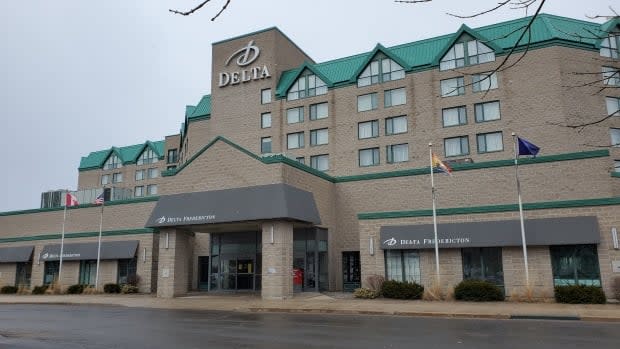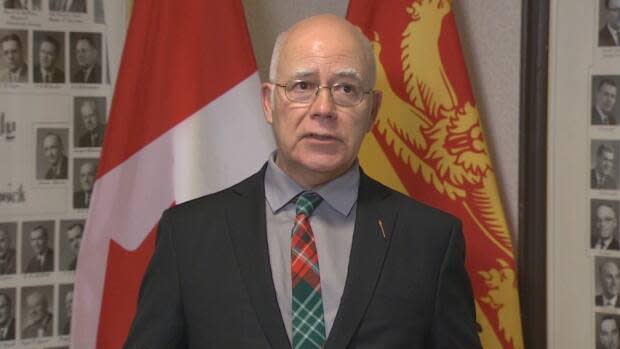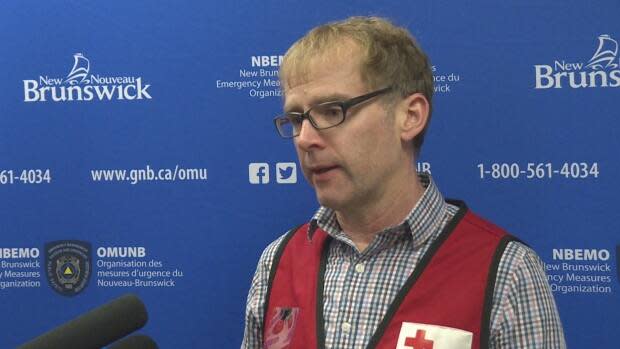Province reviews quarantine hotel program amid COVID cases at Delta

Provincial government and Red Cross officials are meeting this weekend to discuss how to make the designated hotel quarantine program for non-essential travellers safer and better.
It comes as Public Health has now confirmed 15 positive cases of COVID-19 connected to the Delta Fredericton, including at least one employee, as of Friday.
Public Health has not declared it an outbreak but has put in processes similar to those used with outbreaks at long-term care homes to manage risks and get testing done.
As of Friday, 226 adults and four children are isolating in hotels.
Representatives from the Red Cross and the departments of health and public safety decided it would be "a good idea to … take a pause and reflect and take a closer look at what we're doing," said Bill Lawlor, provincial director of the Red Cross, which is managing the quarantine hotels.
"Is there something else that we can be doing to make this more safe for travellers, other hotel guests, employees of the hotels? So that's what the review is undertaking this weekend."
All aspects of the three-week-old program will be evaluated, said Lawlor. For example, officials will look at which hotels are currently being used, the intake process, and how non-essential travellers are referred to certain communities "in a way that is keeping very mindful of the safety of the general public, certainly the travellers and employees of the respective hotels as well."
"Is there something that we should be adapting or changing a bit to improve the experience for everyone? There's several stakeholders in this. Of course, there's the travellers themselves. There's the health testing teams, there's the hotels themselves and communities at large.
"So we're really taking a closer look to determine if there's a way to improve the current operation as it stands today."
Lawlor expects some information about the outcome of the meetings will be available early next week.

On April 23, the province announced leisure travellers, business travellers, people moving to New Brunswick, including most students and people helping them move, had to isolate at a designated hotel for at least seven days, at a cost of about $200 a day. If they test negative for COVID-19 on Day 5, they can complete their 14-day isolation at home.
The Delta has been serving as one of the province's designated quarantine hotels from the beginning.
On Thursday, Chief Medical Officer of Health Dr. Jennifer Russell confirmed the Delta is no longer part of the program, leaving only three. At that time, two positive linked cases of COVID-19 had been identified at the hotel.
By Friday, Department of Health spokesperson Bruce Macfarlane said five "direct" cases at the Delta had been confirmed, and another 10 cases are direct contacts of previously confirmed cases.
Macfarlane did not say if the cases involve staff, isolating guests or regular hotel guests but previously said at least one case involved an employee.
Those who are at the Delta will complete their isolation there.

Green Party Leader David Coon has said the positive cases at the Delta raise questions about what training staff at the quarantine hotels received so they could safely interact with guests arriving to self-isolate.
Lawlor noted that several hotels in the province have been participating in some form of an isolation program since the beginning of the pandemic. People on work isolation, for example, check in, are permitted to be at the hotel, permitted to report to work, and back to the hotel, but nowhere in between, so they require support for various things, such as meal delivery.
"So I share that to, I guess, advise that it's not new to the hotel sector," he said. "They've been doing this for a while."
But the Department of Health did produce some specific guidelines for the non-essential traveller program, which have been shared with the designated hotels "to add some more clarity to the requirements, given certainly an increased volume."
Lawlor could not immediately say when the guidelines were shared. "It was earlier in the program and I know that there have been some revisions to it since then."
Examples he provided sounded more like a guest orientation — that guests need to remain in their rooms, that their rooms won't be cleaned during their stay and information about testing.
Pressed further, Lawlor said: "They are "not dissimilar to a lot of Public Health guidelines that are out there in the community.
"There's a bit of a myth, I suppose, if I could phrase it this way," he said. In the early days of the program, the Red Cross received concerns from members of the public who thought everybody who was going to a hotel was COVID-positive.
"Which in fact was never the case. It was that they were going there as a part of the provincial government program to ensure that they were not going into the community."
"So the guidelines, as much as they're there to make sure that the traveller is clear on what's happening, they have been developed to ensure the safety of the personnel within the hotel."

An unknown number of Delta employees and their households are now isolating.
Potential public exposure notifications for the hotel and its restaurant, STMR.36 BBQ & Social, have also been issued for May 6 to 12 and for April 26 to May 2.
About 25 other public exposure notices in the Fredericton area have also been issued but it's unclear if any are linked to the Delta.
No information about the index case or source of transmission has been released.
The chief medical officer of health had said she believed a replacement hotel for the Fredericton Delta would be announced.
That will be part of the review, said Lawlor.
If one is chosen, it won't be announced.
The program stopped publicly stating which hotels are being used as designated quarantine sites "for a number of reasons," said Lawlor.
"It actually led to some of the congestion and confusion from travellers and hotels alike, where travellers were reaching hotels and calling them to make reservations in some cases before they even had approval from the GNB travel registration program to enter the province," he said.
In some cases, they were "panic-reserving," calling several hotels to make reservations to ensure they could get a spot.
Now, once people are officially registered and receive approval from GNB, the Red Cross will work with them to determine the "most appropriate" hotel for them to go to.
When the program began, seven hotels were named. The Woodstock Best Value Inn quickly declined to participate, leaving six. Now it's down to three.
Lawlor declined to comment on what happened to the other two, saying it's up to the hotels to say.
"I can safely state that there are no concerns about not having adequate room availability at this time," he said.
Asked whether three hotels will provide enough capacity moving forward, particularly with the possibility of the Atlantic bubble reopening as early as July 1, Lawlor said that will also be part of the review.
"What are the number of hotel rooms required and what makes the most sense to keep folks as safe as possible for the foreseeable future until such time that the program is no longer required?"

 Yahoo Movies
Yahoo Movies 